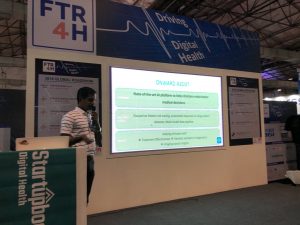An engineer, with an MBA from IIM Lucknow, Dinesh Koka was exposed to the healthcare sector with his first stint at GE Healthcare. Having worked in the healthcare sector for 15+ years and in a country like India that faces huge healthcare challenges, Dinesh says, it was pretty obvious that he wanted to do something in that space. “But it’s more about where you want to start – improve services, or the technologies used in healthcare. There are multiple things you can do. It’s about finding that niche for yourself”. In fact, one of the ideas he toyed with before embarking on the patient-engagement platform was improving the patient discharge process. He spent many days sitting in hospitals watching the discharge process. “It takes a minimum of 6-7 hours for a patient to get discharged”. But he soon realised that it meant changing several internal processes that hospitals rely on. “And for a startup, you must pick a problem that you can solve without relying on changing too many processes that are dependent on others. (Otherwise) It’s bound to fail.”

Onward Health: Birth Of The Idea
It was a personal situation (Dinesh’s mother’s knee-replacement surgery) with its accompanying challenges that made him realise it was patient adherence they wanted to go after. He realised quickly enough that this was a problem everyone faced. “Even doctors acknowledge that only about 50-55% of their patients will adhere in totality to their instructions”, remarks Dinesh. That’s when the idea of using technology as an intervention was born. It was mid-2016 when Onward Health was rolled out as an app to hospitals to streamline post-discharge instructions. Through a simple communication platform, patients can manage their medication, physiotherapy, nutrition, maintain record of vitals and so on. Doctors in turn can use it to remotely monitor their patients and see if they are following their instructions. They have tied up with 5 major hospitals in Hyderabad offering orthopaedic and cardiac services. For the design of the platform alone, they won many awards, from the Healthcare Challenge Winner at BioAsia 2017 in Hyderabad, February 2017 to Asian Finalist (Top 6) in Grants4Apps Singapore chosen by Bayer Health, May 2017 to the more recent “Best Patient Experience” at Innovating Care Asia Pacific Awards 2017 in Malaysia, October 2017.

Soft Pivot Towards Analytics
The platform today onboards 80-90 patients each week through hospitals. However commercial success has been a little elusive. “Monetization of the patient-engagement platform has been slow. And even from the very start, we wanted to add an analytics layer to it in that we wanted to monitor patients, do an analysis of patient adherence to instructions, medications, and give this data back to the doctors so that doctors know if their line of treatment is working or not”, says Dinesh. They tried to tap into the overseas market too by pitching to a couple of hospitals in Singapore but couldn’t scale it to that level. Dinesh talks about his co-founder Vikas Ramachandra, who’s based out of California and heads Data Science.Vikas comes with an impressive background and expertise across computer vision, machine learning having worked with Qualcomm, and healthcare analytics startups in the Bay Area. He also holds 10 patents in the areas of computer vision and machine learning, and another 5 have been applied and are under review. Confident of this capability and expertise in the team, Onward began research into the analytics space.

Building Blocks Of OnwardAssist
Speaking from the CIE incubator, Dinesh says that with the renewed focus, Onward Health is now an umbrella under which the patient-engagement platform is called OnwardCare and the healthcare intelligence platform OnwardAssist. They are positioning themselves first as a predictive analytics platform. The focus currently is on Oncology because “no two people with the same cancer indications are treated the same”. We need to know a lot more about a patient’s makeup and other related information before treatment can be recommended,” says Dinesh.
The company is developing tools and dashboards in the areas of:
- Risk scoring of patients – On the basis of lab tests, genetic tests, biomarkers and so on, OnwardAssist calculates the risk score for cancer patients. Based on the score, the oncologist can decide on the line of treatment for the patient and even predict patient response.
- Digital pathology and mammography – Automated diagnostic tools based on computer vision that serve as “assistants” to pathologists, providing valuable insights which in turn will be passed on to the oncologists.
- Digital Imaging – Estimate the survival and readmission for each patient, by combining image features along with other patient related features such as age, gender, history, medications, genetics, etc.
Early Stages
Working Towards A Marketable Product
The computational pathology-based tool has received great feedback from the medical community. They are in a couple of research partnerships in the areas of Histopathology as well as cancer treatment response prediction. “Our research partners will use the platform, validate it and then, we take it to the market”, says Dinesh. While they may have already received validation from clinicians, the focus now will be on narrowing down on and refining these tools.
Funding
Apart from the early seed funding from friends and family, OnwardAssist has received funding from Launchpad which is the IIIT-H fund. The company is currently busy deploying the MVP (Minimum Viable Product) tools and collecting client feedback. Dinesh says that while they are in the prototype stage now, they have received some enquiries from potential investors. The team comprises of 7, with 6 of them based out of Hyderabad and Vikas in the US. Fresh inflow of funds, when received, will go towards expansion of the team, especially researchers and those with PhDs in Computer Vision and Machine Learning.
CIE and IIIT-H
While the research from the medical science point of view may be complete, Dinesh says the work from the computer vision or machine learning point of view is in the early stages. According to Dinesh, from an enablement point of view, being a CIE-backed startup helps in getting the initial introductions. Their presence at CIE tries to leverage the close proximity to academic faculty at IIITH. Onward Health is trying to use academic expertise to align it with their own goals. Some of the research centres at IIITH are involved in research in cutting edge technology. “We have hired interns too but we’re looking at higher-level partnerships at the Department level with a focus on research”. Since much of their business is based on research, Onward’s presence on campus also gives them access to related publications, peer-review journals, frequent talks and seminars from world renowned speakers in the fields of machine learning and AI.

Patient-Support: A Full Circle?
With much of their current focus on AI, Onward is looking at partnerships with interested others who can lead and manage the patient-support tool and do justice to it. Dinesh is quick to add, “Though our full-time focus today is on the AI platform, patient engagement still has a role in our long-term vision as well.” The plan is to eventually bring patient-engagement back into the analytics platform. “Because ultimately the patient engagement layer would allow us to give richer insights to the doctor based on what the patient’s status is.”
Key Takeaways
When asked to share some of his own learnings with other entrepreneurs, Dinesh points out that clinical validation is a must for anyone starting out in the healthcare space. “Make sure you have a clinical advisor on board from Day 1. This will give you credibility when you approach investors also.” Onward Health always had a clinician from the start who validated all clinical protocols, making sure they matched existing clinical processes. Another tip for those in the AI and machine learning space that Dinesh swears by is to stay close to academia. “In cutting edge space, in areas of AI and machine learning, most of the fundamental improvements in deep learning, computer vision, are still happening inside institutes. So, it’s always good to stay connected.”
Market
According to an industry report, the market for artificial intelligence (AI) in healthcare is expected to grow from USD 667.1 million in 2016 to USD 7,988.8 million by 2022, growing at a CAGR of 52.68% during the forecast period. There is no corresponding data for India alone. Notwithstanding the obvious challenges that a country like India faces in the adoption of healthcare analytics, these are exciting times for the healthcare landscape with ventures such as Onward.


